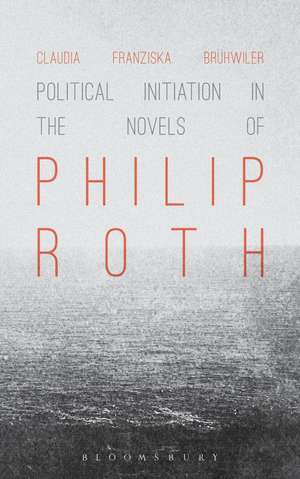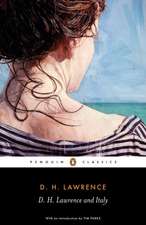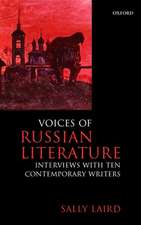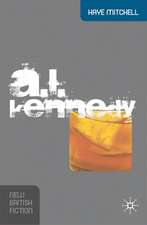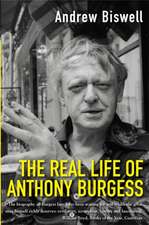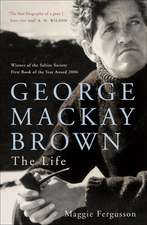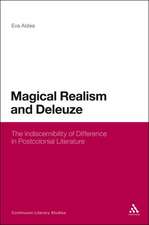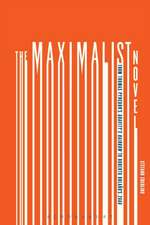Political Initiation in the Novels of Philip Roth
Autor Claudia Franziska Brühwileren Limba Engleză Paperback – 22 oct 2014
| Toate formatele și edițiile | Preț | Express |
|---|---|---|
| Paperback (1) | 255.47 lei 6-8 săpt. | |
| Bloomsbury Publishing – 22 oct 2014 | 255.47 lei 6-8 săpt. | |
| Hardback (1) | 713.29 lei 6-8 săpt. | |
| Bloomsbury Publishing – 19 iun 2013 | 713.29 lei 6-8 săpt. |
Preț: 255.47 lei
Preț vechi: 294.34 lei
-13% Nou
Puncte Express: 383
Preț estimativ în valută:
48.88€ • 50.43$ • 40.79£
48.88€ • 50.43$ • 40.79£
Carte tipărită la comandă
Livrare economică 26 martie-09 aprilie
Preluare comenzi: 021 569.72.76
Specificații
ISBN-13: 9781628925357
ISBN-10: 1628925353
Pagini: 192
Dimensiuni: 152 x 229 x 10 mm
Greutate: 0.26 kg
Editura: Bloomsbury Publishing
Colecția Bloomsbury Academic
Locul publicării:New York, United States
ISBN-10: 1628925353
Pagini: 192
Dimensiuni: 152 x 229 x 10 mm
Greutate: 0.26 kg
Editura: Bloomsbury Publishing
Colecția Bloomsbury Academic
Locul publicării:New York, United States
Caracteristici
Sheds new light on the development of Roth's political consciousness
Notă biografică
Claudia Franziska Brühwiler is Lecturer at the University of St. Gallen, Switzerland.
Cuprins
Prologue / I Framework / 1. Beginnings and Transitions in Political Science and Literature / II Classical Initiation Stories / 2. Political Awakenings in The Plot Against America and Indignation / 3. Guided by the Particularizer: I Married a Communist / 4. Political Odysseys: Prague, Israel, and Elsewhere / III Initiation as Radical Self-Invention / 5. Passing and Other Escapes from the Hereditary Predicament / 6. The Religious Void, or Terrorist Art: Fanaticism as a Quest for Identity / IV De-Initiation / 7. For Another Go: (Zucker)man as a Perpetual Initiand / Epilogue / Bibliography / Index
Recenzii
Brühwiler considers the 'ambiguities of beginnings' in Philip Roth's oeuvre, looking specifically at Roth's representation of the evolution of an individual's political self... Exceedingly well researched, Political Initiation in the Novels of Philip Roth covers a wide range of Roth's novels and the intertexts within them. Putting this fiction into conversation with predominant thinking in the social sciences, Brühwiler's work not only serves as a model for Roth studies, but also as a model for interdisciplinary research overall.
This book is an amazing critical journey through the works of Philip Roth. It offers new approaches to the complex relationships between the factual and the fictional, opening inspirational views to the ambiguous landscape of Roth's creativity. Roth's novels are redefined in Claudia Franziska Brühwiler's essay by the political textures of society and the ways characters express the process of their own initiation and development. Brühwiler reveals with an extremely sharp eye the multiple ways Philip Roth plays games with his readers, how he makes them struggle between the undefined, the transitor,y and the fragmentary in a space of counter-realities. With a sense of literary imagination, theatrical sensibility, and critical thinking Brühwiler unfolds Roth's panorama of political identities, whereby she shows creators, scholars, political scientist and literary theorist how to read fiction in a nutritious way. This is a necessary book that vindicates the dialogue between arts and sciences, bringing inclusive approaches to the tense experience of historiography and fiction. Identity, diversity and otherness are expressive tools that make Roth novels connect with global history and individual existence. The term initiation is in constant movement between the anthropological and the political, adding new attributes to the creative power that builds Roth's characters. Literary theory has a lot to learn from the new approaches political science is adding to fiction. This excellent book by Claudia Franziska Brühwiler proves through the works of Philip Roth that political consciousness is the new poetics of politics in the space of creative imagination and identity.
This book is an amazing critical journey through the works of Philip Roth. It offers new approaches to the complex relationships between the factual and the fictional, opening inspirational views to the ambiguous landscape of Roth's creativity. Roth's novels are redefined in Claudia Franziska Brühwiler's essay by the political textures of society and the ways characters express the process of their own initiation and development. Brühwiler reveals with an extremely sharp eye the multiple ways Philip Roth plays games with his readers, how he makes them struggle between the undefined, the transitor,y and the fragmentary in a space of counter-realities. With a sense of literary imagination, theatrical sensibility, and critical thinking Brühwiler unfolds Roth's panorama of political identities, whereby she shows creators, scholars, political scientist and literary theorist how to read fiction in a nutritious way. This is a necessary book that vindicates the dialogue between arts and sciences, bringing inclusive approaches to the tense experience of historiography and fiction. Identity, diversity and otherness are expressive tools that make Roth novels connect with global history and individual existence. The term initiation is in constant movement between the anthropological and the political, adding new attributes to the creative power that builds Roth's characters. Literary theory has a lot to learn from the new approaches political science is adding to fiction. This excellent book by Claudia Franziska Brühwiler proves through the works of Philip Roth that political consciousness is the new poetics of politics in the space of creative imagination and identity.
